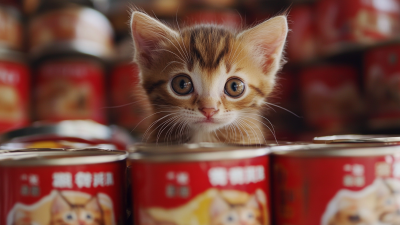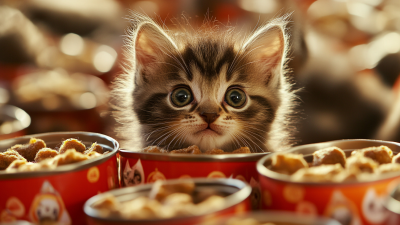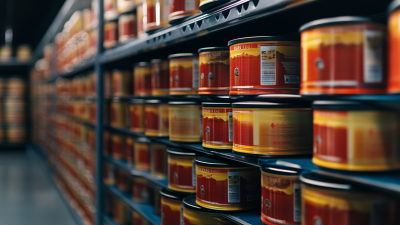When it comes to ensuring the health and happiness of your kittens, selecting the right diet is crucial. Canned kitten food stands out as a highly recommended option due to its balanced nutrition and palatability. Unlike dry food, canned varieties provide essential moisture that helps keep your young feline hydrated, while also containing vital proteins and nutrients needed for their rapid growth and development. In this ultimate guide, we will explore the seven best canned kitten food options available on the market, each tailored to meet the specific dietary needs of your playful companions. Whether you're a new pet owner or looking to upgrade your kitten's diet, this comprehensive list will help you make informed decisions that promote optimal health and vitality for your furry friends.

When selecting the best canned kitten food, it’s crucial to understand the nutritional requirements of growing kittens. Kittens require a balanced diet rich in protein, fats, vitamins, and minerals to support their rapid growth and development. According to the Association of American Feed Control Officials (AAFCO), kitten food should contain at least 30% protein and 9% fat, which are essential for building strong muscles and providing energy. Furthermore, higher protein content is vital since kittens can lose weight quickly if their dietary needs are not met.
In addition to macronutrients, micronutrients play a significant role in a kitten's health. For instance, taurine, an essential amino acid, is critical for heart health and vision. The National Research Council (NRC) emphasizes that kittens need approximately 0.2% of their diet to be taurine. Moreover, vitamins A, D, and E, along with minerals like calcium and phosphorus, are necessary for bone development and overall well-being. Ensuring that canned food options meet these standards will help provide a happy, healthy start for your growing kitten.
When selecting high-quality canned kitten food, it's essential to focus on key ingredients that promote healthy growth and development. One crucial component to look for is animal protein, which should ideally be the first ingredient listed. This protein source provides the necessary amino acids that support muscle development and energy levels in growing kittens. Additionally, fats, particularly omega fatty acids, are important for maintaining a healthy coat and skin, while also supporting cognitive function.
Another vital ingredient is taurine, an essential amino acid that plays a significant role in heart and eye health. Ensuring your kitten food contains sufficient taurine can help prevent serious health issues later in life. It's also beneficial to look for foods with added vitamins and minerals, as these nutrients will foster overall well-being and assist with their immune system development. Choosing high-quality canned kitten food rich in these ingredients will help provide a strong foundation for your furry friend's health and happiness.

When selecting the best canned kitten food, it's crucial to consider recommendations backed by veterinary experts. According to a 2022 report by the American Association of Feline Practitioners, proper nutrition during a kitten's early months is essential for long-term health, impacting their growth, immune system, and overall vitality. Canned food options rich in high-quality proteins and essential nutrients are often favored by veterinarians, as they help keep kittens hydrated and support their developing bodies.

Noteworthy brands often highlighted by veterinary professionals include Royal Canin, Hill's Science Diet, and Wellness. These brands have been formulated with specific ratios of proteins, fats, and carbohydrates that meet the unique dietary needs of kittens. For instance, research published in the Journal of Animal Science indicates that nutritional profiles with a high protein content—above 30%—are critical for muscle development in growing kittens. Choosing a high-quality canned food not only lays the groundwork for a kitten's health but also establishes lifelong feeding habits that contribute to their happiness and vitality.
When considering the best canned kitten food, one key aspect to analyze is the comparison between grain-free and grain-inclusive options. Recent studies indicate that a significant percentage of pet owners are leaning towards grain-free diets, believing they’re healthier for their felines. Grain-free formulations often feature higher protein content sourced from meat, which is essential in a kitten's development stage, promoting muscle growth and overall health. A report by veterinary nutritionists suggests that protein-rich diets can lead to improved energy levels and vitality in growing kittens.
Conversely, not all kittens may require a strictly grain-free diet. Grain-inclusive options can provide essential nutrients and dietary fiber, beneficial for digestion. A study published by the American Veterinary Medical Association highlighted that formulations including whole grains can aid in maintaining stable blood sugar levels in young cats. Ultimately, the choice should depend on your kitten’s specific health needs and dietary preferences, emphasizing high-quality ingredients, whether they contain grains or not.
Transitioning your kitten to a canned food diet can be a smooth process with the right approach. Start by introducing canned food gradually, mixing it with their current dry food. This not only helps your kitten acclimate to the new taste and texture but also minimizes digestive upset. A good rule of thumb is to begin with a 25% canned food to 75% dry food ratio, increasing the canned portion slowly over a week or two until your kitten is fully transitioned.
Be mindful of your kitten’s preferences during this transition. Cats can be particular eaters, so offering a variety of flavors and brands of canned food may help find the right match for your furry friend. Additionally, warming the food slightly can enhance its aroma, making it more appealing. Remember to monitor your kitten’s health and appetite closely, as a sudden change in diet can lead to gastrointestinal issues. Patience and observation are key to ensuring your kitten not only accepts the new diet but thrives on it.






